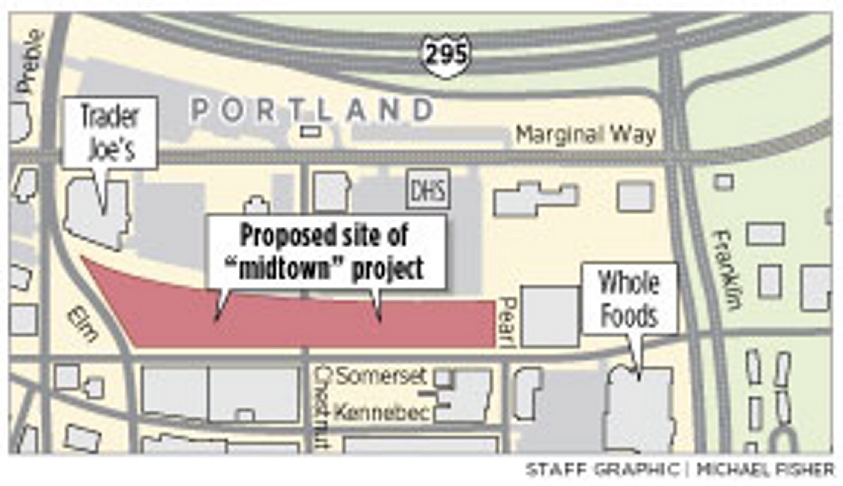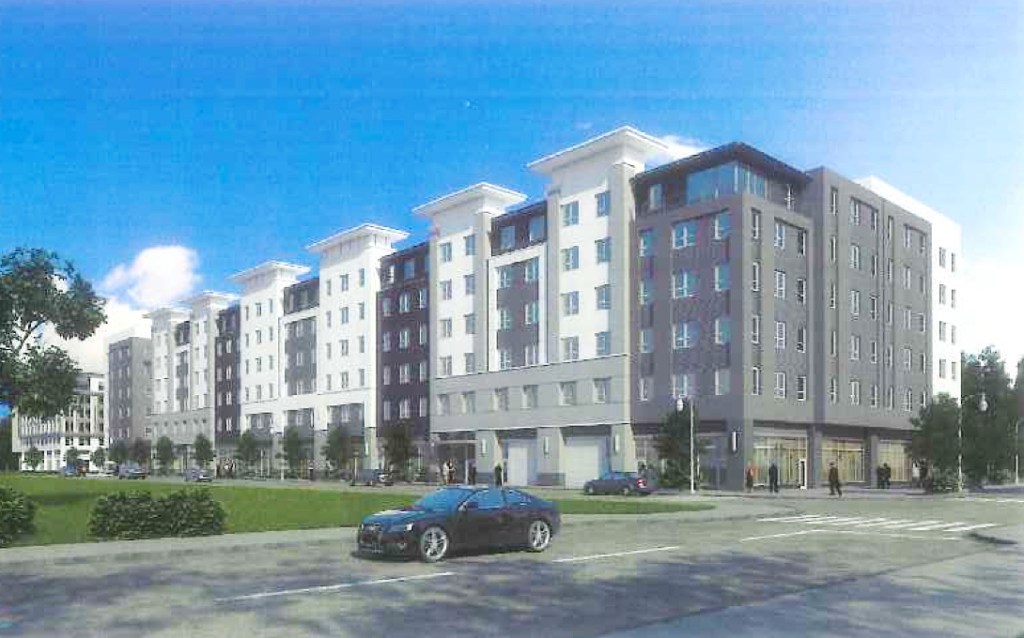The developer of the proposed “midtown” project that had promised to bring 440 apartments to Portland’s Bayside neighborhood threatened Friday to sue the city for breach of contract after city officials said an option to buy the city-owned land on Somerset Street had expired.
“In light of the significant time and expense involved in this project and the city’s obstructionist position on a number of matters central to its progress, Federated is left with no option but to litigate” if the city forces the developer to go before the City Council to renew the purchase agreement, the chairman of Federated Cos. wrote in a letter to the city Friday.
The threat of a lawsuit comes weeks after the developer told city officials it was looking into replacing two of its four planned apartment buildings with hotels, according to correspondence provided to the Press Herald.
City staff said in a letter Thursday to Miami-based Federated Cos. that the developer would not only have to submit new plans for city review and approval if it wants to put hotels at the site, but also that its option to purchase the city-owned land on Somerset Street had expired and it must go back before the City Council to renew the agreement.
The developer responded Friday with the threat of a lawsuit.
Both the developer and city officials say they continue to want the project to move forward. However, the lawsuit threat is the latest obstacle for a project that has been under consideration for four years and faced organized opposition because of building heights and other impacts, a lawsuit, a total redesign of the project and a long list of city conditions.
In March, the Planning Board approved 440 apartments in four buildings of six stories each, along with a parking garage for 800 vehicles and 87,000 square feet of retail space on Somerset Street. Both city officials and the developer had hoped to get the project underway this summer.
DEMAND FOR HOUSING NOT AS DIRE
The developer inquired in mid-May about the possibility of building hotels. Federated’s desire to convert two of those apartment buildings would result in the loss of 180 apartments, according to the June 18 letter from Greg Mitchell, the city’s economic development director to Jonathan Cox, the Federated Cos. chairman.
Back in 2011, Federated’s project was poised to be the first major development of market-rate housing in Portland in roughly a decade. Since then, a tight housing market and vacancy rate near zero have spawned a slew of market-rate projects that have been proposed, approved and built or are under construction.
While the desire for much-needed housing near downtown helped to build city support for the project, Cox said in his letter Friday that delays caused in part by the city meant that other housing developments have moved ahead at a faster pace to satisfy the market demand.
“The demand which factored into this project’s design and forecasting has been partially absorbed by a number of other projects which have sailed through the city’s permitting process with little issue, while Federated has watched from the sideline,” he wrote.
Federated has not yet made an official proposal to change the land use. While several other housing projects have moved forward, Portland also has seen the construction of several new hotels in recent years.
Mitchell said in his letter that the change would require Federated to go before the Planning Board for another site plan review – an arena where the developer has faced stiff resistance in the past.
Mitchell also said that the purchase-and-sales agreement for the 3.5-acre city-owned parcel between Pearl and Elm streets had expired, and that the council would need to approve an extension.
“Notwithstanding that fact, staff has no reason to believe that the city’s commitment to selling the property to Federated has changed,” Mitchell said. He later added, “The city remains committed to advancing the Midtown project.”
Jessica Grondin, the city’s communications director, said Friday that the sales agreement expired on May 27. She attributed the project’s delays to the developer, saying they were slow to assemble a development team.
However, Federated’s chairman argued Friday that the sales agreement remains valid and that there was no expiration date in the agreement.
Cox threatened to sue the city unless it changes its position, because delays already have posed “significant obstacles and caused measurable detriment” to getting the project underway this summer. His letter says the company has spent nearly $2 million “in what appears to be a never-ending process of debating even the simplest matters while the city’s wish list continues to grow and in a manner out of step with market realities.”
Earlier this week, before the exchange of letters, Cox told the Press Herald that Federated was working with city staff to address the nearly 30 conditions that were placed on the project’s approval. Once those were addressed, Cox said, the company would close on the sale and begin construction. He did not mention the prospect of hotels.
“We are working with the city to satisfy the conditions (before) closing,” Cox said. “We’re ready, willing and able to close when those conditions have been met.”
PROJECT ENCOUNTERED MANY HURDLES
Federated agreed to buy the city-owned land for $2.3 million in 2011. The following year, the city agreed to help finance the construction of a $15 million parking garage, which has not yet been built.
The proposal Federated unveiled in the fall of 2013 included four high-rise towers approaching 165 feet tall. The Planning Board and City Council agreed to rezone portions of the property to accommodate the tall buildings, which initially would have included 650-800 market-rate apartments and 100,000 square feet of retail space.
In January 2014, the Planning Board approved a master development plan for the phased development, which was expected to occur over the next decade, as well as the site plan approval for one high-rise tower at Somerset and Pearl and a parking garage. The approval came after six board workshops and two public hearings, which divided residents.
Shortly afterward, a group called “Keep Portland Livable” appealed the decision on the basis that it did not comply with the city’s Comprehensive Plan.
In October 2014, Federated agreed to scale down the project to avoid a lawsuit. The new design eliminated a parking garage and 400 parking spaces, and lowered the building heights by about half to 72 feet. The remaining 92-foot tall parking garage became the tallest building in the development, which was expected to be built in one phase.
Send questions/comments to the editors.




